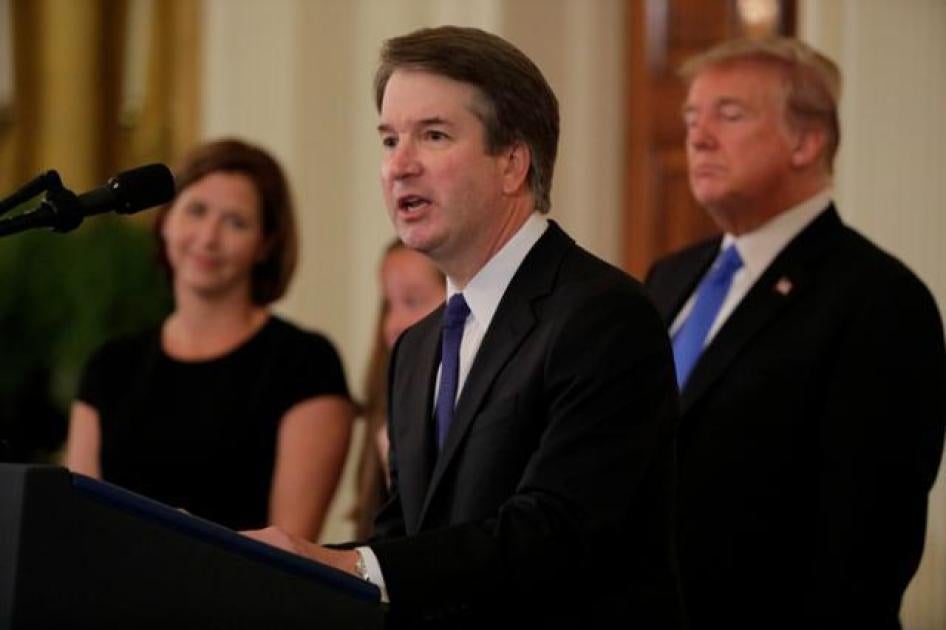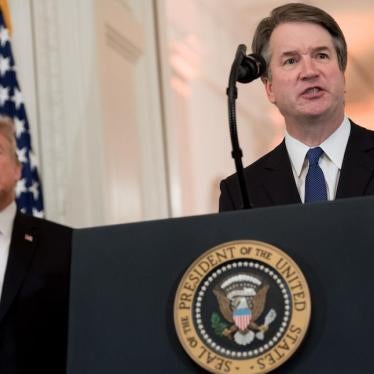(Washington, DC) – After a third woman came forward accusing United States Supreme Court nominee Brett Kavanaugh of sexual misconduct, Human Rights Watch urged the Senate Judiciary Committee to halt the vote on his nomination. Human Rights Watch has already expressed serious concerns about the lack of transparency in the nomination process, and about the human rights protections at stake given Kavanaugh’s record.
The US Senate Judiciary Committee scheduled a vote on appointing Brett Kavanaugh to the US Supreme Court for Friday, one day after a woman who alleges Kavanaugh sexually assaulted her in 1982 testifies before Congress.
“This nomination process has been flawed from the start,” said Nicole Austin-Hillery, US program director at Human Rights Watch. “To proceed with a vote before Kavanaugh’s full record can be examined, especially in light of these sexual assault allegations, only compounds the serious concerns we already had about his nomination.”
In August, ahead of Kavanaugh’s nomination hearing, Human Rights Watch issued an extensive analysis of Kavanaugh’s available record and expressed serious concern he would interpret the US Constitution in ways that could erode federal protections for a range of fundamental human rights. Human Rights Watch has also expressed concern that Senate leadership did not request millions of pages of documents relating to years when Kavanaugh held senior positions at the White House, and that many requested documents had not been produced in time for his hearing that began on September 4. To date, millions of pages have still not been produced or are being withheld from the public.
Days after Kavanaugh’s Senate hearing, the press reported confidential allegations made to a member of Congress by Christine Blasey Ford that Kavanaugh sexually assaulted her at a party in 1982 while the two were both in high school. On September 16, Dr. Blasey Ford came forward publicly with her allegations and later agreed to testify before the Senate Judiciary Committee on Thursday, September 27. Kavanaugh will present testimony that same day.
On Tuesday, September 25, reports emerged that the Senate majority members had scheduled a vote on Kavanaugh’s nomination for Friday, a day after Ford’s testimony. Chair of the Senate Judiciary Committee Chuck Grassley (R-IA) said he only scheduled it for Friday because Senate rules require three days of notice and he was only considering it a “potential” vote date. With so much uncertainty about these allegations, the Senate should not be scheduling even a potential vote at this stage, Human Rights Watch said.
On September 23, The New Yorker published an article where a second woman, Deborah Ramirez, came forward with another accusation of sexual misconduct dating back to her and Kavanaugh’s time at Yale University. Ramirez called for an investigation but is so far not scheduled to testify before the committee.
Today, a new accuser, Julie Swetnick, has stepped forward and in a sworn affidavit transmitted to Senate Judiciary Committee staff she alleges that Kavanaugh was present when multiple boys raped her. She alleges it happened while she was incapacitated without her consent, and possibly drugged, at a party in approximately 1982. Among other allegations from the period between 1981 and 1983, she says she witnessed Kavanaugh fondle and grab girls without their consent at various parties. Through her attorney, Swetnick has requested an FBI investigation.
“Ford and anyone alleging sexual misconduct on the part of Kavanaugh has a right to be heard as part of a fair and non-partisan process, before the Senate decides on this lifetime appointment,” Austin-Hillery said. “Rather than jamming a vote through, Senators need time to deliberate about what comes to light during this process, before any decision about this important nomination is even considered.”








